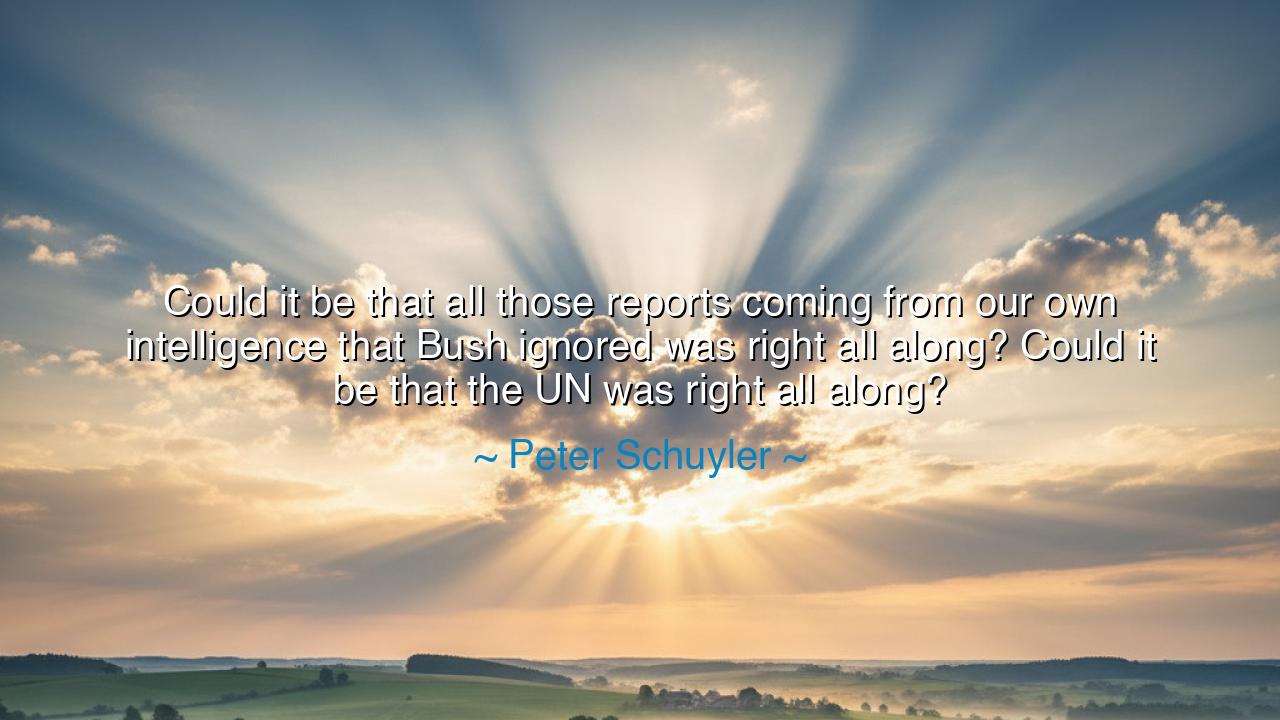
Could it be that all those reports coming from our own
Could it be that all those reports coming from our own intelligence that Bush ignored was right all along? Could it be that the UN was right all along?






“Could it be that all those reports coming from our own intelligence that Bush ignored was right all along? Could it be that the UN was right all along?” Thus spoke Peter Schuyler, in a moment of reckoning, his words trembling with the weight of hindsight and the ache of truth unheeded. These words, born from the turbulence of the Iraq War, are not merely a question — they are an elegy for wisdom ignored and a warning for all generations who mistake power for certainty. Within them echoes the voice of a citizen disillusioned by the arrogance of leaders, and the eternal lament that arises whenever truth is silenced by pride.
Schuyler’s words arose during the years that followed the invasion of Iraq in 2003, when the world learned that the weapons of mass destruction — the very justification for war — were never found. Before the bombs fell and the soldiers marched, intelligence reports had cautioned restraint. United Nations inspectors, under the leadership of men like Hans Blix, had pleaded for patience, saying their searches had revealed no evidence of forbidden arms. Yet the march to war continued, driven by fear, ambition, and conviction that dissent was weakness. When Schuyler later asked, “Could it be that they were right all along?” he was not only addressing the failures of one administration, but pointing to a flaw in the soul of humankind — the refusal to listen when truth does not flatter desire.
This question, deceptively simple, carries within it the timeless tragedy of ignored warnings. History, like a mirror, reflects this pattern across ages. The Trojan priest Laocoön, in the ancient epics, cried out against the wooden horse at the city gates — “Beware of Greeks bearing gifts!” But the people, drunk on victory and longing for peace, mocked his caution. They dragged the horse into their city, and before dawn, Troy was in flames. So too did the modern world, blinded by certainty, dismiss its own prophets of reason. Intelligence officers, analysts, and international observers — these were the Laocoöns of our time, strangled not by serpents, but by bureaucracy and disbelief.
Schuyler’s question thus becomes more than political commentary; it becomes moral inquiry. What is it in the heart of power that deafens it to truth? What is it in the mind of man that turns away from evidence when it contradicts his will? The ancients called this hubris, the sin of excessive pride — the belief that one’s own judgment stands above the gods, above reason, above all counsel. In every age, hubris has led rulers to ruin. From Oedipus, who refused to see the truth of his own fate, to Napoleon, who ignored the snows of Russia, the pattern endures: the powerful do not fall because they are ignorant, but because they refuse to learn.
There is, too, in Schuyler’s lament, a quiet reverence for the institutions of reason — the intelligence community and the United Nations — those flawed but essential bodies through which humanity seeks to temper might with wisdom. His words remind us that such institutions, when they speak truth, must not be dismissed as obstacles to action, but valued as guardians of conscience. The UN, often derided as slow or divided, yet stands as the last echo of the ancient councils — the assemblies of wise men and diplomats who, in earlier times, gathered to prevent the flames of war. To ignore them is to turn away from the collective wisdom of humanity and to walk once more into the darkness of arrogance.
And yet, this reflection is not meant to condemn one nation or one leader alone. It is a mirror held before us all. How often in our own lives do we ignore the quiet voices of reason, the counsel of experience, or the warnings of conscience? How often do we, in the certainty of emotion or ambition, close our ears to the truths that might have spared us regret? Schuyler’s question, when spoken with the voice of wisdom, becomes an invitation to humility — to listen before we act, to pause before we destroy, to question before we believe.
Therefore, O listener, let these words be more than history — let them be instruction. The next time you stand at the threshold of decision, remember that power without reflection is blindness, and conviction without humility is peril. Seek counsel even from those who disagree. Examine the evidence, even when it unsettles your belief. For wisdom does not dwell in certainty but in the courage to doubt. Let us, as individuals and as nations, learn to listen to truth even when it is inconvenient, for the price of ignoring it is always the same — disillusionment, loss, and the haunting question: “Could it be that they were right all along?”
And so, Schuyler’s words endure — not as accusation, but as a call to vigilance. They remind us that truth is not the possession of the mighty but the inheritance of all who dare to seek it. Let future generations remember this lesson well: that the strength of a nation lies not in its armies nor in its leaders, but in its capacity to listen, to learn, and to act with wisdom born of humility.






AAdministratorAdministrator
Welcome, honored guests. Please leave a comment, we will respond soon